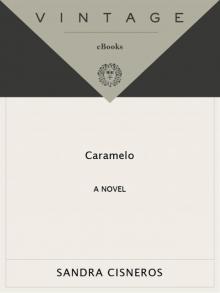- Home
- Sandra Cisneros
Martita, I Remember You/Martita, te recuerdo Page 5
Martita, I Remember You/Martita, te recuerdo Read online
Page 5
* * *
Richard and I bought a brick three-flat, and now we’re busy fixing it up and hope to pay the mortgage with the rents from the apartments below. But it’s a lot of work, Martita. And both of us tied to paying for it now. And coming home from work exhausted and having to work on the apartments, too, and feed our girls.
* * *
My first marriage was to a big goofy kid of a man. We thought we couldn’t have children. The doctors said there was nothing wrong. Just nerves, they said. If I would only relax. But tell me, how can you relax when your parents adore your husband more than you do? And you feel miserable because you don’t, and you wait for a little chink, a little air, and you pretend to fall asleep when he stumbles into bed and touches you and your body flinches. And you know already, he knows already, you already know.
* * *
Then when we did divorce, a few months later I met someone who wanted to sleep with me, and I thought, why not? I deserve to be held, don’t I? The absurdity of it, to fall in love so completely, to be in love finally, and to become pregnant just like that.
* * *
This is when the dreams began. A Bengal tiger leapt on top of me and tamped me down as if I were a bundle of crushed grass. He smelled of the night before it rains, his weight overwhelming. I could feel his heart pulsing through his flesh. When he began to snore, I knew I could keep perfectly still and live or make my escape and risk waking him. I dreamt this same dream over and over.
* * *
Because I couldn’t bring myself to decide, my body decided for me. Some part of me died with the miscarriage. Some when he left. To have the person you love alive, living on the planet, alongside you in time but choosing to not live alongside you. This is worse than death, I think.
* * *
At work I sometimes take a bag lunch and eat it across the street in the art institute’s sculpture garden. It’s nice there. A fountain, a few stone benches, lots of green. Peaceful when the weather’s good, and best of all, it’s free. I was eating my sandwich when a sparrow flitted down near my shoe, hopped under a bush, and started to enjoy a dust bath. A little fluff of feathers skittering in a great cloud of dirt. It’s only your spirit, wide as a sky, as if a thousand sparrows opened their wings inside your heart.
* * *
Something heaved up from my stomach, and I thought I was going to be sick. But what came out of me was a series of yelps like an animal hit by a car. A security guard ran over and asked me if I was okay. I told him I was having female troubles, and that wasn’t a lie.
* * *
I don’t call myself a writer anymore, but I console myself with books, with reading. Before, it was all about how I looked to others. Now I just want to look good to myself. That’s just as important, isn’t it? If not more.
* * *
I work for the gas company on Michigan Avenue, the job I used to work summers to pay for college. Better you should do something practical, my father said. Because I was so tired of being poor, so frightened of it. Going to work with clothes that always give you away. Living in terror of the mail. Money problems always nipping at your ankles, even when you think you’ve outrun them. But they follow you, don’t they? All my life trying to keep a little ahead. It broke my father’s heart to see me poor. It broke mine to have him see me that way.
* * *
Do I like my job? No, I don’t like it. Of course not. I like eating buttered bread with my coffee. I like reading books. It’s a job that pays well. Something I can depend on, like the man I live with.
* * *
People look at me and they just see a woman who works in an office. It’s as if your body isn’t an anchor or an iron bell anymore. That’s all. Just someone who answers the phone. Nobody asks me, What’s that you’re reading? Eduardo Galeano’s The Book of Embraces? Gwendolyn Brooks’s Maud Martha? Elena Poniatowska’s La Flor de Lis? Xenophon’s A History of My Times?
* * *
No. I like sitting under a tree. I like going to the lake and looking at the water and pretending it’s the Promenade des Anglais, and that white building behind me, let’s say it’s the Hôtel Negresco. Lake Michigan changing color every season like an aquamarine I used to wear on my left hand, third finger. But the lake is so far away from where I live. It costs to get there. Everything in this world costs. Marta, did you know they made you pay five francs to sit on a bench on the Promenade des Anglais?
* * *
It’s a long bus ride to the lakefront, and then a walk through the park, hoping no one bothers me. And by the time I get there I’m exhausted, but there it is, lapping, lapping, lapping. Nothing but water and water. The city is beautiful if you can get to the lakefront every day. You have to be rich to do that without exhausting yourself. Any city is beautiful if you’re rich.
* * *
I think it’s curious how the rich always have more light and sky and pretty lawn. How when you’re just trying to get by, there isn’t time to take care of those little things that make for such big happinesses, is there?
* * *
Me and Richard, we put our savings together and spent it on drywall and formica and tile and two-by-fours for our building. We call it “ours” even though nothing’s paid for. Hutch, apartment, three-flat. If we don’t like something, there’s no landlord to complain to but each other. Our hair stiff with dust and fingers stained orange with varnish. We take it seriously. Till we raise our heads and have a good look at each other. Then we just laugh.
* * *
Richard says: —Corina, why can’t you leave well enough alone? The hutch was fine the way it was—the color of Coca-Cola. But I say it’s the color of cockroaches. I’ve got one cabinet door peeled clean as an almond. Slow work, but I don’t give up, maybe because Richard thinks I will. I don’t go crazy, either. Just keep at it, stripping a little bit each day after work on the days I’m not too tired and every Saturday without fail. Well, there isn’t much time for going to the lake.
* * *
Our building is off the expressway, which is how we got it so cheap. And at first you can’t sleep with all that whooshing noise, but after a while you get used to it. Sometimes I pretend that whoosh is the sound a shell makes, the sound of the ocean when it heaves its breath and lets it go again. You can get used to anything I suppose.
* * *
Sometimes I think of you at odd moments, Marta. When I’m teaching the youngest how to brush her own hair or painting my toes on the back porch and painting my girls’ toes, too. I suspect it must be that way for you, too. Which is when we both must be thinking of the other, tugging and yanking like tides.
* * *
To lose myself in a book, Martita. In 88 BC, Mithridates, king of Pontus on the Euxine, was at war with Rome. Isn’t that pretty? Did you know the Euxine was what they called the Black Sea back then?
* * *
To live in a book for a little. A story. A poem. Wonder how it is a poem can say so much so beautifully. I used to grow sad to witness all that joy alone, because Richard’s too tired to notice that sort of thing. But I’ve gotten used to enjoying things on my own.
* * *
This morning, rereading your letters and drinking my coffee in the kitchen and sitting under a little square of sunlight that comes through the lace curtain in a graceful pattern, just sitting here and looking at the walls and not thinking anything special. Just to be able to sit, nice and warm in this lovely square of sunlight, and to not have to go to work today, and no one calling me, and the house very quiet for once, my Richard and our lovely girls all safe and snug at the library. And far away the sound of the expressway whooshing like the ocean, and to realize suddenly…happiness.
* * *
Sometimes when I look at trees in winter, how their bare branches give off a violet light. Or the scent of a baguette. Or the Moroccan design on an antique doorknob. Or how a window opens out instead of up.
They remind me of those days I lived beside you, Martita. Though I don’t tell anyone, I think it. Without regret. We don’t write each other anymore, but I still think of you, Marta. Un recuerdo. A remembrance, a souvenir, a memory. Te recuerdo, Martita, I remember you.
Don’t forget me…
I hug you,
Your Puffina
Acknowledgments
My Martita is based on all the women who rescued me during my years as a cloud and ever after, just as Corina is all the women whose lives have touched my own. I do not know why some lives resonate so ineffably within me that they oblige me to sit and stare at dust motes. Each is a note humming beyond the range of human hearing but whose reverberation enriches my being.
I can cut my hair myself, but I depend on my Macondo family for helping me with the back. Thanks to Ruth Behar, Macarena Hernández, Reggie Scott Young, and especially Liliana Valenzuela. Lili, it is pure joy to see the title returned to its original incarnation and to hear Martita speaking as she does in my imagination.
In San Miguel de Allende, gracias to Charlie Hall for the generous gift of time in a parsimonious season. All of Taxco’s silver to the sterling María Belén Nilson Nazar for polishing with her jeweler’s cloth the porteño voices.
Again and always, I must thank my sister Jasna Karaula Krasni in Sarajevo for inspiration and, above all, love.
For taking care of life’s details so that I could keep on writing, I am indebted to Yvette Marie DeChávez, Ernesto Hilario Espinoza, and Eunice Misraim Chávez Muñoz.
I appreciate the professionals at Vintage who labored to produce this book: my editor, LuAnn Walther, and her Vintage team: Ellie Pritchett, Zuleima Ugalde, Perry De La Vega, Kayla Overbey, Indira Pupo, Nicholas Alguire, Laura Martínez Espinel, Hayley Jozwiak, James Meader, Alex Dos Santos, and Annie Locke. Thanks to the Penguin Random House Audio team, Executive Producer Aaron Blank and Assistant Denise Lee, to Studio Engineer Gabriel Heiser of Estudio San Miguel, and to the actors who assisted in the audio performance.
Cristóbal Pera, noble and generous of spirit, gave editorial attention to my Martita en español above and beyond the call of duty. Cristobal, it is my good fortune to have met you.
Jaya Dayal shared her dream about the Bengal tiger and, when I asked if I might have the dream, generously gave it to me. Thank you for letting me use it in this story.
There are spirit guides in my world known as duendes, magos, naguales, brujos, aluxes, chaneques, and literary agents. I am lucky to have two—Susan Bergholz and Stuart Bernstein. Stuart, we are on our magical way. Adelante con ganas. Susan, you changed the publishing world with your life work, but I am the most fortunate from this endeavor. Mil y un gracias.
The gifted educator Jerry Weston Mathis dream-traveled from the other side to suggest Martita should be performed as theater. For this suggestion, and for recognizing my powers early in my career well before I did, you have my gratitude.
Perhaps no one believed in this story as tenaciously as Dennis Mathis, even when it was parked in the driveway, sitting on cement blocks, for years. Thank you, Dennis, for the jumper cables. You are the finest story mechanic I know and my dear, dear friend.
Finally, I must acknowledge my editor of many years, Robin Desser. I have possibly as many pages of editorial notes from you as I have pages of the story. Thank you for your love and labor on Martita’s behalf. Above all, thank you for your steadfast faith in me. I look forward to our next literary adventure. Till then, let us celebrate.
A mis antepasados, a la luna llena, a la luz que siempre me vigila, gracias.
Sandra Cisneros
Martita, te recuerdo
Sandra Cisneros nació en Chicago en 1954. Internacionalmente aclamada por su obra de poesía y ficción, que ha sido traducida a más de veinticinco idiomas, ella ha recibido numerosos premios, incluyendo la Medalla Nacional a las Artes, el premio PEN/Nabokov y una beca de la MacArthur Foundation. Cisneros es autora de La casa en Mango Street, Caramelo, El arroyo de la Llorona, My Wicked Wicked Ways, Loose Woman, Hairs/Pelitos, Vintage Cisneros, ¿Has visto a María?, Una casa propia, y Puro Amor. Cisneros tiene doble nacionalidad de México y Estados Unidos y se gana la vida con su pluma.
www.sandracisneros.com
Liliana Valenzuela ha traducido obras de Sandra Cisneros, Julia Alvarez, Denise Chávez, Cristina García, Gloria Anzaldúa y muchos otros escritores. En 2006 recibió el Alicia Gordon Award for Word Artistry in Translation. Como poeta, su poemario bilingüe más reciente es Codex of Love: Bendita Ternura (FlowerSong Press, 2020). También es colaboradora del podcast www.hablemosescritoras.com. Originaria de la Ciudad de México, vive en Austin, Texas.
www.lilianavalenzuela.com
Otras obras de Sandra Cisneros
¿Has visto a María?
Caramelo
El arroyo de la Llorona
La casa en Mango Street
Loose Woman (poesía)
My Wicked Wicked Ways (poesía)
Hairs/Pelitos (libro infantil)
Vintage Cisneros
Una casa propia
Puro amor
Índice
Acerca de la autora
Otras obras de Sandra Cisneros
Página de título
Dedicatoria
Martita, I Remember You
Martita, te recuerdo
Agradecimientos
A Susan Bergholz
y
para Dennis Mathis
y Robin Desser
Casi todos los sábados puedes encontrarme en el comedor con mi espátula y mi soplete, una vez que la cocina está limpia y las niñas están en la biblioteca. En 88 a. C. Mitríades, el rey del Ponto Euxino, estaba en guerra con Roma…Jenofonte. Las cosas borbotean de no sé qué lugar dentro de mí, como las pegajosas capas de barniz que ataco con el soplete.
* * *
El barniz se pela en tercas virutas, poniendo a prueba mi paciencia. No tengo derecho a quejarme. Fue idea mía raspar la madera en lugar de pintar. Todos los apartamentos de Chicago en los que he vivido alguna vez tienen una alacena como la nuestra en el comedor, empotrada en una pared y recubierta de ciento seis años de barniz como capas de hojaldre griego empapado en miel.
* * *
En 88 a. C. Mitríades, el rey del Ponto…y entonces tengo que dejar a un lado la espátula, apagar el soplete y rebuscar en el clóset de invierno, más allá de las carpetas de contrato de la casa y certificados de nacimientos e impuestos sobre la propiedad, buscándote en cartas de donde brotan fotos, una servilleta de papel festoneada, timbres de Francia, Argentina, España, sobres de papel de china enmarcados con las rayas del correo aéreo, la caligrafía apretada y rizada como tu pelo.
* * *
Y es como si estuviéramos hablando entre nosotras, todavía, después de tanto tiempo, Martita.
Querida Puffina:
No sé si fui yo quien no contestó tu carta o vos no contestaste la mía. Ya no importa.
* * *
Estaba arreglando la cómoda y en un cajón me encontré tus cartas. (Espero que la dirección sea la misma). Entonces me volvió todo, ese Año Nuevo en París y, más que eso, una sensación, un sentimiento…No tengo buena memoria, pero sí recuerdo las emociones.
* * *
¿Cuántos días nos conocimos? Ni siquiera sé. Pero sé que te tomé mucho cariño, Puffina. Es lo que sentí de golpe cuando encontré tus cartas.
* * *
Quiero que lo sepas. Es todo. Tengo una foto de nosotras —vos y yo y Paola— tomada en el metro en una de esas cabinas automáticas. ¿Recordás? Me alegra tenerla.
* * *
Tratar de contarte a vos todo lo que me ha pasado desde entonces me resulta difícil…
* * *
Estuve a punto de casarme, pero no pudo ser. Hace poco que rompí el compromiso y estoy un po
co triste. Ya pasará.
* * *
En mayo regreso a Europa para evitar el invierno argentino. Estaré en Madrid. Acá está la dirección en caso de que todavía estés viajando:
Marta Quiroga Pascoe
A/A Irene Delgado Godoy
Villanueva y Gascón no. 2–3a
28030 Madrid

 Have You Seen Marie?
Have You Seen Marie? Woman Hollering Creek: And Other Stories
Woman Hollering Creek: And Other Stories The House on Mango Street
The House on Mango Street A House of My Own: Stories From My Life
A House of My Own: Stories From My Life Loose Woman
Loose Woman Caramelo
Caramelo Martita, I Remember You/Martita, te recuerdo
Martita, I Remember You/Martita, te recuerdo A House of My Own
A House of My Own My Wicked Wicked Ways
My Wicked Wicked Ways